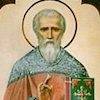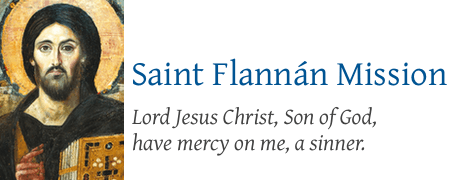 In the Name of the Father and of the Son and of the Holy Spirit, one God. Amen. Dear beloved, Christ is born, glorify Him! We are in the heart of the afterfeast of the Nativity of Christ our Lord, and we celebrate also, the Holy Apostle St Timon the Deacon, and St Zoticus, caregiver to the orphans and the poor. Holy Saints Timon and Zoticus, pray for us.
In the Name of the Father and of the Son and of the Holy Spirit, one God. Amen. Dear beloved, Christ is born, glorify Him! We are in the heart of the afterfeast of the Nativity of Christ our Lord, and we celebrate also, the Holy Apostle St Timon the Deacon, and St Zoticus, caregiver to the orphans and the poor. Holy Saints Timon and Zoticus, pray for us.
Two of the ills of the contemporary world are indifference and absenteeism. When one is confronted with challenges, it would seem common to find a person shying away from facing the challenges head on to resolve the problems, and in time, such a person might even become absent from the face of challenges altogether. It would seem to begin with indifference, and then ends with absenteeism. Suffering and pains are not easy to face, and when facing the suffering and pains of another, we might be tempted to shy away from caring altogether.
I chose the word indifference to describe this social phenomenon, because it implies a lack of care, or a heart dead to the suffering of another. Why did I not choose the word “apathy” instead?
The word “apathy”, seems to share the same roots as the Greek word “apatheia”, and therefore might cause confusion to some. The Greek word “apatheia” describes a positive condition whereby a person is free from emotional disturbances, while the word “apathy” describes a negative condition of a person who lacks care or interest in the challenges of another person. Apatheia has a meaning of freedom from our passions, and in our pilgrimage towards God, a freedom from passions often means single-mindedness unto God.
So, where indifference and absenteeism seem more common, what can we do for our faith? In a single word – presence.
In the season of the Nativity of Christ, we rejoice at the birth of our Lord Jesus Christ, who came to bring us life through Him, as we reflect on St John 10:9-16. Christ is the door to God, and we are to enter to the Kingdom through Him, for He is the Good Shepherd, and we joyously proclaim our faith as His obedient sheep. Likewise, we reflect on Hebrews 7:26-8:2, and we rejoice at the presence of Christ our Lord and King, the eternal High Priest seated at the right hand of God. The faithful gather at the Divine Liturgy, to receive the Holy Gifts, and we rejoice at His presence. Therefore, we the humble sheep of our Lord, always yearn towards the receiving of Holy Gifts, because He is ever-present.
In the Nativity, we are also mindful of our Panaghia, Mother of God, who also showed us as a pioneer, to what “presence” means. She said yes to the command of God at the Evangelismos (or the Annunciation) conveyed by the Archangel Gabriel. She was ever-present through the carrying of Jesus, and the caring of Jesus to adulthood, obediently and meekly throughout His ministry. Our Panaghia showed us being present is to be faithful to God.
We read from Acts 6:1-6 of the Holy Apostles, that the Twelve chose seven men as deacons, having found them to be full of the Holy Spirit and wisdom, and one of them is St Timon the Deacon. St Timon was sent out by the 12 Holy Apostles to help destitute Christian widows. Later, he was consecrated as Bishop of Bostra in Arabia, where many found faith with him. He died a martyr in a burning furnace. St Timon showed us the same concept of “presence”, where the vocation of the diaconate presented him to be in service to the suffering widows, as the Church sees the Holy Orders as a living martyrdom to serve Christ and the needs of others.
St Zoticus, the saint known for his care for orphans, is also exemplary of being present and being of service to the needs of others, as we reflect on Deuteronomy 15:7-10 and Wisdom of Sirach 2:1-5.
He was a rich Roman, and acquainted with the Emperor Saint Constantine the Great. When St Zoticus took up Holy Orders, the emperor gave him a sum of money and he built a place to house the sick, the homeless, those with leprosy who were ordered to be drowned by soldiers, and orphans. When the emperor St Constantine reposed, his son Constantius, a heretic, took over. St Zoticus was arrested by Constantius on the false claim of corruption, and killed. Where St Zoticus reposed, a healing stream emerged which miraculously healed many.
Closer to our time, I recently read of a story by an anonymous author. I am unsure if it is true, but the idea of “presence” is found brilliantly in this story. I adapted it for brevity here.
A nurse brought a worn-out soldier to the bedside of an old man, “your son is here.”
The old man barely opened his eyes, heavily sedated because of a heart attack. He reached out to the young soldier, and the young soldier wrapped his hands around the old man’s hand.
The nurse brought a chair so that the soldier could sit beside the bed. She saw the young soldier holding the hand of the bedridden old man throughout the night. The nurse suggested to the soldier that perhaps he could rest a while, but the soldier refused. Despite the many distracting sounds and sights especially typical in a busy hospital, the young soldier was steadfast holding the hand of the old man beside him, and uttered words of love and encouragement to the old man.
Dawn came, and the old man died. The soldier released the lifeless hand he held on to the whole night, and went to inform the nurse. The nurse offered her sympathy to the young soldier, and the young man interrupted her by asking, “who was that old man?”
The nurse was startled, “he was your father!”
“No, he wasn’t. I have never seen him in my life,” said the soldier.
“Then why didn’t you say anything when I led you to him?”
The young soldier replied, “When you called me to the old man, I knew you made a mistake. But I knew he needed his son who wasn’t there. I realized he was too sick to know I was not his son, and knowing how much he needed me, I stayed.”
In life, when we reflect on the Holy Word, let us try our best to be present for another person, because sometimes, our presence itself, is our love for another.
Let us, in the joyous season of the Holy Nativity, remember that God has blessed us too richly. Let us remember our Panagia, Most Holy Theotokos, who is our role model of faith unto God. Let us call on His Holy Name often, “Lord Jesus Christ, Son of God, have mercy on me, a sinner”.
Let us close by praying the thanksgiving prayer:
It is truly meet to call thee blest, the Theotokos, ever blessed and most pure, and the Mother of our God. More honorable than the Cherubim, and more glorious than the Seraphim, without corruption thou gavest birth to God the Word: True Theotokos, we magnify thee.
O virgin Theotokos, rejoice; O Mary full of grace, the Lord is with thee. Blessed art thou among women, and blessed is the fruit of thy womb, for thou hast borne the Savior of our souls, Jesus Christ our Lord. Amen.
Fr Raphael+
Readings
Deuteronomy 15:7-10
Sirach 2:1-5
St John 10:9-16
Hebrews 7:26-8:2

